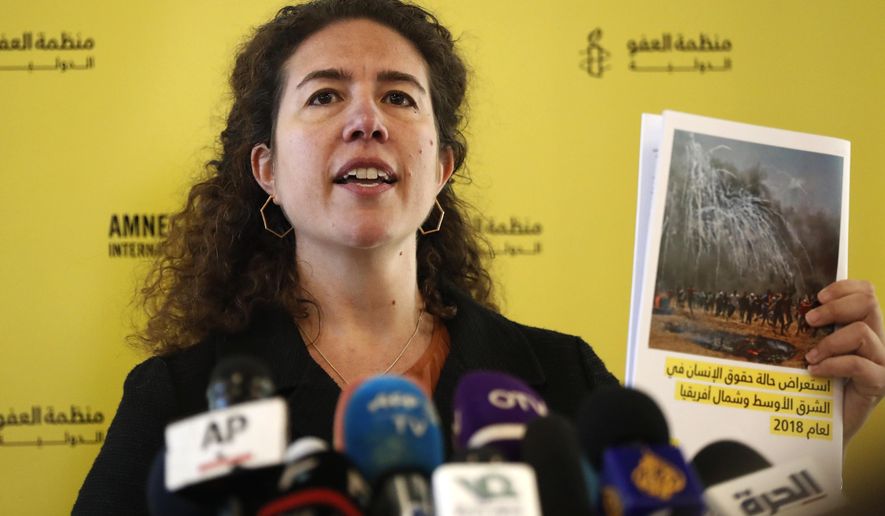BEIRUT (AP) - The world community’s “chilling complacency toward wide-scale human rights violations” in the Middle East and North Africa emboldened governments to commit “appalling” violations last year, Amnesty International said Tuesday.
The group’s annual survey of the human rights situation in the region, released in Beirut, said ongoing crackdowns on dissent and civil society “intensified significantly” in Egypt, Iran and Saudi Arabia.
It also cited the killing of journalist Jamal Khashoggi by Saudi agents in the kingdom’s consulate in Istanbul in October, saying it “has not been followed by concrete action to ensure those responsible are brought to justice.”
Amnesty said Khashoggi’s killing prompted rare action from countries such as Denmark and Finland to suspend the supply of arms to Saudi Arabia. It added that Saudi Arabia’s main allies, including the U.S., Britain and France “have taken no such action and, as a whole, the international community has failed to meet demands by human rights organizations for an independent U.N. investigation capable of delivering justice.”
Amnesty called on all countries to immediately suspend the sale or transfer of arms to Israel and the warring sides in Yemen “until there is no longer substantial risk that such equipment could be used to commit” violations.
The conflict in Yemen began with the 2014 takeover of the capital, Sanaa, by the Iran-backed Houthis, who toppled the government of Abed Rabbo Mansour Hadi. A Saudi-led coalition allied with Hadi’s internationally recognized government has been fighting the Houthis since 2015.
The fighting in the Arab world’s poorest country has killed thousands of civilians, left millions suffering from food and medical care shortages, and pushed the country to the brink of famine.
“It took Jamal Khashoggi’s cold-blooded murder inside a consulate to prompt a handful of more responsible states to suspend arms transfers to a country that has been leading a coalition responsible for war crimes and has helped create a humanitarian catastrophe in Yemen,” said Heba Morayef, Regional Director for the Middle East and North Africa at Amnesty International.
In Iran, 2018 was designated by Amnesty International as a “year of shame” after authorities arrested more than 7,000 protesters, students, journalists and others, many arbitrarily.
In Saudi Arabia, authorities arrested and prosecuted government critics, academics and human rights defenders. In a wave of arrests in May 2018, at least eight women human rights defenders who had campaigned against the ban on women drivers and the guardianship system were detained without charge.
“Virtually all human rights defenders in Saudi Arabia are now behind bars or have been forced to flee the country,” Amnesty said.
In Egypt, authorities intensified their crackdown on dissent in the run-up to presidential elections.
In Syria, the government disclosed the death of some of those subjected to enforced disappearance in previous years by updating civil status records, but failed to provide the families with remains, it said. Tens of thousands of people, including peaceful activists and government opponents, humanitarian workers, lawyers and journalists remained disappeared.
Philip Luther, research and advocacy director for the Middle East and North Africa at Amnesty, said allies of governments in the region put lucrative business deals, security co-operation or billions of dollars’ worth of arms sales ahead of civil rights concerns “time and again.”




Please read our comment policy before commenting.